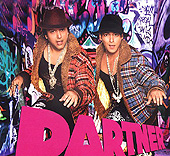 |
 |
 |
| WE ARE LIKE THIS ONLY: (From top) Partner, Om Shanti Om and Dhoom 2 have Hindi lyrics with English phrases |
“All hot girls put your hands up and say, Om Shanti Om. All cool boys, come on make some noise and say, Om Shanti Om…”
Well, hot girls and cool boys are doing just that — making noise, that too a great deal of it. And the noise is a reflection of a changing Indian society where English rules. These bindaas global citizens are proud to chant, ‘Kya cool hain hum!’
“The liberal sprinkling of English words in the Hindi language is a mark of the changing times,” says lyricist Javed Akhtar, who has penned the songs in Farah Khan’s Om Shanti Om, including the one that urges the young — hot or cool — to raise their hands. “The current Hindi film lyrics are merely a reflection of this contemporary language, though they may not always be palatable.”
All this while, all that heroes and heroines had to do to endorse a western milieu was say a few words such as “I love you” and “Shut up!”, sport stylish hats and chic suits and shake a leg to essentially Hindi songs in exotic foreign locales. Only a few songs had English words — and those were usually dictated by the script. But today a Western hip-hop essence permeates almost all current Bollywood lyrics.
Lyricist and adman Prasoon Joshi, who has composed the lyrics for Aamir Khan’s directorial debut Taare Zameen Par, to be released shortly, places this change in perspective. “Language is not static. It is constantly evolving through influences and reflects the changes in our socio-cultural milieu,” he points out. That explains Hindi film titles such as Jab We Met or Jaan-E-Mann: Let’s fall in love…again, Heyy Babyy, Partner and No Smoking. “It’s not just about catering to the MTV generation. The change is far more fundamental.”
The focus, clearly, is on the young, and the language they speak. “Today’s cinegoers are mostly in the age group of 14-30. So we need to offer them something they can connect to,” says lyricist Sameer, who composed the lyrics for the title track of Saawariya. He is also the man behind the Bhool Bhulaiyya promotional track, “Teri aankhe bhool bhulaiya… I keep looking for you baby…I keep praying all day...All day, all night long, Hare Ram, Hare Ram, Hare Krishna Hare Ram…”
The first time Sameer heard the tune, he loved it, he says. So he immediately set about writing the mukhra and inserted the phrase, Hare Krishna Hare Ram, knowing that it would catch on with youngsters. “At the same time, I realised I would have to justify its insertion and ensure a sense of continuity while retaining the romantic lilt,” he says.
Sameer is all for this “khichdi bhasha”. “I feel whatever happens is good or else it wouldn’t happen. So this change must be good,” But puritans voice their reservations. Film-maker Sudhir Mishra, for one, stresses he has nothing against English. What he objects to is that everything “has been reduced to inanity. That is reflected in the lyrics. A film’s hollowness and lack of substance are camouflaged by speed and a certain basic beat that pervades Indian film music.”
The title song from the film Cash, “Yeh toh seedhi seedhi baat hai… Cash is right for me, Cash to the front for me, Cash is the day for me, Cash is the night for me...” perhaps, underlines Mishra’s point about the transition of the Hindi language which has much to do with the changing mindset of upwardly mobile youth often perceived as being in a hurry to succeed materially.
The president of the Film Writers Association, Hasan Kamal, is equally unhappy about the apparent “assault” on Hindi. “This is like a bubble and is bound to burst sooner or later,” says the lyricist, who belongs to the chaste old school of lyricists. “In the last decade, with youngsters reluctant to learn their mother tongue, the biggest casualty has been Hindi. At this rate, two decades down the line, there is bound to be an identity crisis,” he warns.
Movie mogul Manmohan Shetty, however, doesn’t think so. “The change is market driven. What is created is what youngsters would like to see.” Music composer Pundit Lalit of the Jatin-Lalit duo agrees. “Today songs are composed for boys and girls as opposed to the man and woman in the past. So is essential for the lyrics to capture that spirit of youthful exuberance. This has led to music becoming more Westernised.”
The need of the hour then, as Javed Akhtar puts it, is “a healthy tension between tradition and experiment, while not breaking away from tradition completely.” The definition of good poetry and aesthetics, he says, changes with time. “Considering our rich cultural heritage, we should not be afraid to experiment,” Akhtar asserts.
Perhaps he is right. It is when a language clicks can Generation Bindaas “Dhoom again and run away on a rollercoaster ride… and see their wildest dreams slowly come alive .”

